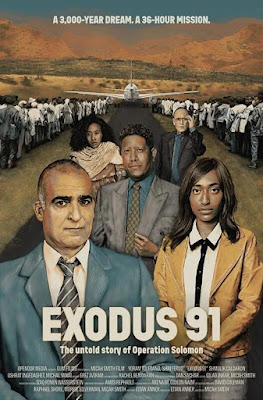In late 1984, the IDF, the Mossad, and the CIA commenced one of greatest humanitarian rescue operations in history, evacuating thousands of Falasha Ethiopian Jews (the Beta Israel) to safety. Operation Joshua was the smaller sequel that soon followed. When the Marxist Mengistu regime lost its Soviet sponsor, a window of opportunity opened for an even larger but less covert operation. Israeli Ambassador Asher Naim was the man appointed to manage the risky negotiations. The heroic efforts of Naim and his colleagues to execute Operation Solomon are chronicled in Micah Smith’s documentary Exodus 91, which screens during the 2023 New York Jewish Film Festival.
The attempted assassination of Ambassador Meir Joffe, depicted in the film’s shocking first scene, created the vacancy Naim filled. He had just returned from a stressful posting in Finland, which at the time was a home for Soviet Refuseniks seeking asylum in Israel. He would be doing similar work in Ethiopia, but on a much greater scale, in a hostile country.
Combining archival video and dramatic recreations, Smith nicely conveys the chaos of the period. The rebels were closing in on the capitol, so thousands of Ethiopian Jews flocked to the Israeli embassy, living in squalid make-shift camps on the surrounding grounds. Disease ran rampant, but the embassy still encouraged more to come, suspecting an opportunity for a large-scale evacuation might arise suddenly and close quickly.
The most intriguing figure who emerges from the film is probably Kassa Kabede, an Israeli-educated Mengistu loyalist, who is appointed the regime’s point person on Jewish immigration issues. In addition to Shai Fredo’s portrayal in recreations, Kabede himself sat for on-camera interviews, shortly before his death. He is definitely a complicated, ambiguous figure. However, Fredo proves you can still do serious acting in docu-re-enactments, especially his final negotiation with Naim wherein he discusses his school days in Jerusalem.
Unfortunately, Naim died before production started, so his brother portrays him in contemporary interview segments. Docu-purists and Israel haters might object to this choice, but at least it is clearly identified as such during the film (unlike the controversial Tony Bourdain voiceovers, for instance). Clearly, there is no intention to fool anyone, because Smith frequently pulls his camera back at the close of re-enactments, to reveal the behind-the-scenes cameras and back-drops.
That also adds a strange hyper-real vibe to Exodus 91 that can be a bit distracting, but also makes it quite stylistically distinctive. Erez Aviram’s score (featuring Israeli jazz musician Eden Bareket on sax) also adds sophisticated and evocative textures. Most importantly, the film tells a remarkable story.
Smith bends over backwards to document subsequent racial discord subsequently experienced by Ethiopian-Falasha Jews and their children in Israel, which highly politicized festival programmers should appreciate. However, the film also points out Operation Solomon directly contributed to the successful campaign to revoke UN Resolution 3379, which notoriously equated Zionism with racism, in the words of Ambassador Daniel Patrick Moynihan codifying anti-Semitism in international law.
We do not hear nearly as much as we should about Operations Moses, Joshua, and Solomon in the media and academia. They are amazing episodes from history that vividly illustrate the character of the State of Israel. Maybe it isn’t perfect—Smith’s film constantly reminds viewers such is the case—but it certainly acted honorably at critical junctures. Highly recommended, Exodus 91 screens twice tomorrow (1/22) as part of this year’s NYJFF.

